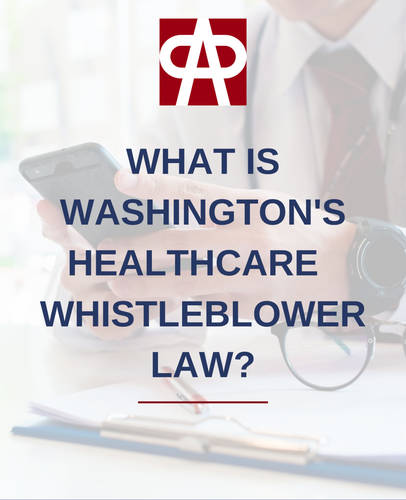
Have you ever witnessed an improper quality of care by a healthcare provider or in a healthcare facility, but you were afraid to speak up because you did not want to get in trouble? In Washington, employees who report violations of healthcare regulations, also known as whistleblowers, receive certain protections under Chapter 43.70.075 RCW (hereinafter, the “Healthcare Whistleblower Law”). The Healthcare Whistleblower Law provides an avenue for certain healthcare workers to confidentially report quality of care concerns.1
Who qualifies as a Whistleblower? In Washington State, employees who report violations of state and federal healthcare laws can receive certain legal protections as a “whistleblower.” A whistleblower is defined as a consumer, employee, or health care professional – inclusive of healthcare providers or any member of a medical staff at a health care facility. These individuals, acting in good faith, report suspected issues regarding quality of care to the Department of Health, or they initiate, participate in, or cooperate with any investigation or administrative procedure under the relevant jurisdiction.2
Whistleblowing can also come with significant risks and challenges. Whistleblowers often face discrimination, retaliation, legal repercussions, and professional or social isolation against you purely because you have exercised your rights related to workplace safety and health. They may also experience emotional distress and financial burden as a result of their whistleblowing. Despite these risks, whistleblowers play an important role in maintaining the integrity of the healthcare industry.
In Washington State, qualified whistleblowers in the healthcare context have numerous protections. Rights and activities that are considered “protected” in Washington State include:
The Healthcare Whistleblower Law then provides several important protections to employees, which include:
Whistleblowers seeking protection under the law should promptly report any observed violation of healthcare laws or regulations. Below are a few steps to follow when seeking protection as whistleblower:
Proper quality of care is a fundamental right of every patient receiving medical attention. Unfortunately, some healthcare providers may not meet the required standards of care, leading to incidents of medical malpractice, errors, and negligence. Patients have the right to receive care that meets these standards, and healthcare providers have a duty to deliver quality care to their patients. Reporting concerns about improper quality of care is important because it ensures that healthcare providers are held accountable for their actions and that patients receive the care, they deserve.8
One of the main reasons to report concerns about improper quality of care is to prevent further harm to patients. Patients may not always be aware of the substandard care they are receiving, and reporting such concerns may help identify instances where harm has occurred or could occur. By reporting concerns, healthcare providers can review their practices and make improvements to prevent future incidents.9 Additionally, reporting can also lead to investigations and disciplinary actions against healthcare providers who fail to meet the required standards of care, ensuring accountability and protecting patients from harm. Lastly, reporting concerns about improper quality of care is crucial in protecting patients’ rights and well-being.
If you need to file a complaint, you can do so by contacting the Washington Department of Health through their website or by phone. Remember, the identity of whistleblowers is kept confidential, and there are remedies available for those who face retaliation.
If you are facing concerns related to healthcare whistleblower protection, call Athan Law at (509) 215-4679. We can help to provide you with the protection you need to navigate this demanding situation.
1See RCW 43.70.075(1)(b) (stating the “identity of the whistleblower shall remain confidential unless the department determines that the complaint, initiation, notification, or report was not made or done in good faith”).
2See RCW 43.70.075(3)(d) (defining “whistleblower” as a consumer, employee, or health care professional including a health care provider as defined in RCW 7.70.020(1) or member of a medical staff at a health care facility, who in good faith reports alleged quality of care concerns to the department of health or initiates, participates, or cooperates in any investigation or administrative proceeding under this section).
3See RCW 43.70.075(1)(a).
4See RCW 4.24.500 (safeguarding individuals who disclose potential wrongdoing to federal, state, or local agencies from the threat of civil action damages, thus supporting effective law enforcement and efficient government operation).
5See RCW 49.60.210 (highlighting that “it is an unfair practice for any employer, employment agency, labor union, or other person to discharge, expel, or otherwise discriminate against any person because he or she has opposed any practices forbidden by this chapter, or because he or she has filed a charge, testified, or assisted in any proceeding under this chapter”).
6See RCW 43.70.075(1)(d) (outlining that the whistleblower “[m]ay initiate a civil action in a court of competent jurisdiction to either enjoin further violations, recover actual damages sustained by the whistleblower, or both, and recover the cost of the suit including reasonable attorneys’ fees”).
7See Id.; See RCW 4.24.520 (granting cost and attorney’s fee recovery to a prevailing agency or, if the agency fails to establish its defense, to the party that brought the action”).
8See RCW 70.56.020(1) (aiming to “[e]stablish an adverse health events and incident notification and reporting system that is designed to facilitate quality improvement in the health care system, improve patient safety, assist the public in making informed health care choices, and decrease medical errors in a nonpunitive manner”).
9See RCW 70.56.040(2)(c) (highlighting the focus on improving patient safety, by developing recommendations for changes in health care practices and procedures to mitigate adverse events and incidents).
Disclaimer: The information provided on this article is for educational purposes only and is not intended as legal advice. Every case or situation is unique, and you should consult with a licensed attorney before taking any action. No attorney-client relationship is formed by downloading or reading this article.
Posted June 02, 2023
